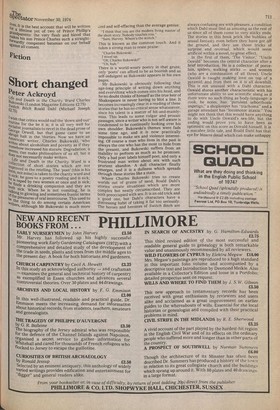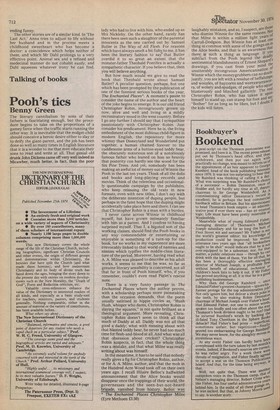Short changed
peter Ackroyd fe and Death in the Charity Ward Charles i.ilkowski (London Magazine Editions £2.75) witch Bitch Roald Dahl (Michael Joseph E2.75) 'wish that critics would nail the 'down and out' _routine for the lie it is; it is all very well for 1:'cialist journalists to revel in the dead prose of abenrge Orwell, but that game came to an A'aIlPt halt in the 'thirties. Now we have an `lnierican writer, Charles Bukowski, Who !rites about alcoholism and poverty as if they 'ornehow increased his stature. Degradation, it ;erns, can make philosophers of us all, but it nes not necessarily make writers. Life and Death in the Charity Ward is a e._ollection of short stories which are not It'll_ Proved in the retelling. The 'poet' (this is his int, not mine) is taken to the charity ward and sick; he goes to a poetry reading and is sick; he ta raped by two women at once and is sick; f• inds a drinking companion and they are talkiooth sick. When he is not vomiting,_ he is • ng In glowing and sometimes frantic terms • the pleasures of oral intercourse. This used to the thing to do among certain American Writers, although Mr Bukowski is much more
,:ool and self-effacing than the average genius:
"I think that you are the modern living master of the short story. Nobody touches you."
"Sure, Harvey. Where's the scotch."
This is known as the common touch. And it takes a strong man to resist praise:
"Charles Bukowski ..."
I stood up. "Oh, Charles Bukowski!"
"Uh, huh."
There is a world-weary poetry in that grunt; only 'poets' can afford to be as boorish and as self-indulgent as Bukowski appears in his own pages. Mr Bukowski is obviously following that age-long principle of writing down anything and everything which comes into his head, and he no doubt thinks of himself as the true heir of Shakespeare in never having to blot a line. It becomes increasingly clear in a reading of these stories that he has no critical sense whatsoever, since his talent is a matter of hit-and-mainlymiss. This leads to some vulgar and prosaic passages, since a writer who is not self-aware is condemned to be continually looking over his own shoulder. Bukowski's themes were fads some time ago, and it is now practically impossible to make sex and violence interesting. Of course a man who lives in the past is always the one who has the most to hide from the present, and Bukowski suffers from an inability to perform as much as he promises. Only a bad poet labels himself poet, and only a frustrated man writes about sex with such Prurient abandon. A dull character finally emerges, and it is a dullness which spreads through these stories like a stain.
Where Charles Bukowski tries to create worlds out of grains of sand, Roald Dahl's stories create situations which are more complex but neatly circumscribed. They are both preoccupied with sex. It is an old trick and a good one, but Dahl's characters have a distressing habit of taking it far too seriously. The heroes and heroines of Switch Bitch are
always confusing sex with pleasure, a condition which Dahl must find as amusing as the rest of us since all of them come to very sticky ends. The stories in this book prick the bubbles of sexual fantasty even before they have got off the ground, and they use those tricks of surprise and reversal, which would seem artificial within a novel, to great effect.
In the first of them, 'The Visitor,' "Uncle Oswald" becomes the central character after a brief introduction. He is a collector: of porcelain, spiders, walking sticks — and_ women (who are a combination of all three). Uncle Oswald is caught making love on top of a pyramid, And from then on it is all downhill. This is not unusual with a Dahl character. Oswald shares another characteristic with his unfortunate ability to use scientific slang as if there were no such thing as body-language: a cook, he notes, has "purulent seborrhoeic impetigo," a shopkeeper has "trachoma" and a garage attendant has 'locomotor ataxia." You might not think that this would have anything to do with Uncle Oswald's sex-life, but the ending would prove you to have been as optimistic on this score as Oswald himself. It is a macabre little tale, and Roald Dahl has that eye for bizarre detail which can make unhappy lady who had to live with him, who ended up as Mrs Nickleby. On the other hand, rarely has there been seen such a slaughter of the parental innocents as the one carried out by Samuel Butler in The Way of All Flesh. For reasons which have always smelt a bit fishy to me, it has been the literary fashion to say4 that Butler overdid it to so great an extent that the monster-father Theobald Pontifex is actually a sympathetic character. If you believe that, then you will believe anything.
But how much would we give to read the book that Theobald wrote about Samuel Butler? A peculiar question, perhaps, but one which has been prompted by the publication of one of the funniest serious books of the year, The Enchanted Places*. A moment's pause to consider the name of the author and the heart of the joke begins to emerge. It is our old friend Christopher Robin, incongruously grown up now, alive and well and living in a mildly recriminatory mood in the west country. Before I go any further I should say that I sympathise passionately with Christopher Robin. Just consider his predicament. Here he is, the living embodiment of the most dubious child-figure in modern English, the repository for more whimsy than Disneyland and Wonderland put together, a human chained forever to the cuddlesome arms of a button-eyed teddy bear, the obscurely notorious son of a notoriously famous father who leaned on him so heavily that posterity can hardly see the wood for the Six Pine Trees. And yet, somebody has been making an awful lot of money out of Winnie the Pooh in the last ten years. Think of all the dolls and books and long-playing records and movies. Think of the relentless and occasionally questionable campaign by the publishers, who keep reissuing the old texts in new formats, even with new titles, I don't say with the deliberate intention of duping people, but perhaps in the faint hope that the duping might accidentally take place here and there. I can see that Christopher Robin is a man with a burden.
I never came across Winnie in childhood myself, but have grown intimately familiar with him as a parent. And I confess to having surprised myself. That I, a bigoted son of the working classes, should find the Pooh books in any way commendable or entertaining or enjoyable is something of a turn-up for the book, for no works in my experience are more irrevocably linked to that world of nannies and ninnies which typifies the middle-class literature of the period. Moreover, having read what A. A. Milne was pleased to describe as his adult works, it seems to me that he was, so far as genuine literary sensibility is concerned, not all that far in front of Pooh himself, who, if you remember, couldn't even read Piglet's rescue note.
There is a very funny passage in The Enchanted Places where the author proves, with a scholarship perhaps more painstaking than the occasion demands, that the poem usually satirised in hippie circles as, "Hush Hush, whisper who dares, Christopher Robin is slaying the squares," is not quite brilliant as a theological argument. More revealing, Christopher Robin doesn't seem to think all that much of Daddy at all. Daddy was not all that good a daddy; what with messing about with that blasted teddy bear, he never had too much time for flesh-and-blood at all. And what was all that obsession about cricket? Christopher Robin Suspects, in fact, that the whole thing I was a mistake, and that what Milne was really writing.about was himself.
In the meantime, it has to be said that nobody really gives a fig for Christopher Robin, author, or for A. A. Milne, author, and that the mob in the Hundred Acre Wood took off on their own years ago. I recall Hilaire Belloc's halfwitted announcement that the Alice books would disappear once the trappings of their world, the governesses and the seen-but-not-heard brigade, vanished from history. Belloc was * The Enchanted Places Christopher Milne (Eyre Methuen £3.50)
lau-ghably mistaken, and so, I suspect, are those who dismiss Winnie for the same reasons. NoE,. that Milne is within a million light years or Carroll-Dodgson. But Winnie has at least one thing in common with some of the goings-on In the Alice books, and that is an awareness that there is such a thing as language. If Y0,0 subtract from the Pooh legend the cleatilY sentimental blandishments of Ernest Shepard s drawings, if you cast from your mind the unutterably incongruous Americanisation 01 Winnie which the moneygrubbers can no doubt justify, you are left with a residue of heffaluMPs and woozles, of haycorns and worraworrawor" ra, of wolery anchspudges, of people who gloze, blusterously and blinched gallantly. The real Christopher Robin, who has taken it upciri himself to stand up, can stamp his foot and sai "Bother" for as long as he likes, but I doubt I the kids will listen.











































 Previous page
Previous page